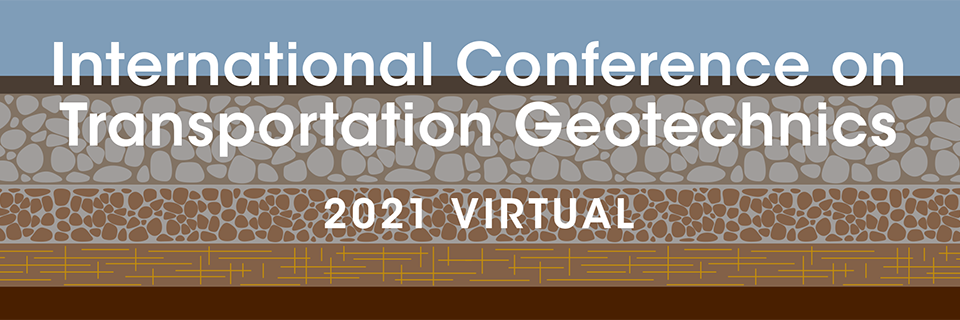Keynote and Special Lecture Speakers
3rd Proctor Lecture
Railway Track Substructure: Recent Research and Future Directions
 Prof. William Powrie, FREng
Prof. William Powrie, FREngProfessor of Geotechnical Engineering
University of Southampton
William Powrie is Professor of Geotechnical Engineering at the University of Southampton, having served as Dean of the Faculty of Engineering and the Environment from 2010-2018. His main technical areas of expertise are in geotechnical aspects of transport infrastructure, and sustainable waste and resource management. He was elected Fellow of the Royal Academy of Engineering in recognition of his work in these areas in 2009.
William’s work on geotechnical aspects of transport infrastructure encompasses groundwater control, in-ground construction to reduce environmental impacts in urban and other sensitive areas, understanding and mitigating vegetation and climate change effects, and fundamental soil behaviour.
Major projects on which he has worked include the A55 Conwy Crossing, the Jubilee Line extension stations at Canary Wharf and Canada Water, and HS1. He is currently working with HS2 on geotechnical and earthworks aspects. He is co-author of Construction Industry Research and Information (CIRIA) reports C750 Groundwater control – design and practice, 2nd edition (2016) and C760 Guidance on embedded retaining wall design (2017). Both of these incorporate results of his research in these areas.
He was Principal Investigator for Rail Research UK (2003-2010), a Universities-based centre for Rail Systems Research, and now leads an EPSRC Programme Grant, Track to the Future, aiming to provide the science needed to underpin a radical overhaul in techniques for railway track design, construction and maintenance. He is Convenor of the UK Collaboratorium for Research on Infrastructure and Cities (UKCRIC) and leads the UK Rail Research and Innovation Network Centre of Excellence in Infrastructure.
He is a former Associate Editor of the Canadian Geotechnical Journal, a former Honorary Editor of the Institution of Civil Engineers journal Geotechnical Engineering and has been Geotechnical Consultant to groundwater specialists WJ Group since 1987.
William’s work in waste and resource management focuses on landfill engineering, and on the development of a sound scientific basis for policy and practice. He led a major EPSRC-funded programme of fundamental research, Science and Strategies for the Management of Residual Wastes, with the aim of enabling and encouraging landfill operation to accelerate biodegradation and stabilization of the waste. He was a co-author of the Institute of Wastes Management report on the Role and operation of the flushing bioreactor.
He worked on the design and engineering risk assessment of the low level radioactive waste repositories at Drigg; and was founding Honorary Editor of the ICE journal Waste and Resource Management; a member of the Scientific Committee of the International Waste Working Group; and chair of the Technologies Advisory Committee for Defra’s £30M programme of research and demonstrator projects for new technologies for the treatment of biodegradable waste. He is the author of the widely respected textbook, Soil mechanics: concepts and applications.
Monismith Lecture
Flexible Pavement Analysis & Design: Charting a Course Forward
 Prof. Athanassios T. Papagiannakis, Ph.D., P.E., F. ASCE
Prof. Athanassios T. Papagiannakis, Ph.D., P.E., F. ASCE Dept. of Civil and Enviro. Engineering
University of Texas at San Antonio
Dr. Papagiannakis is a Professor of Civil Engineering with an academic career spanning over 30 years at Washington State University and at the University of Texas at San Antonio, where he served as the Dept. Chair between 2006 and 2015. His expertise is in pavement engineering, specializing in structural pavement analysis, asphaltic material characterization and traffic loading. He has contributed over 200 journal and conference publications in this area. In addition, he has co-authored the textbook Pavement Design and Materials published by Wiley and Sons in 2008, which is in its fourth printing. He has served as the lead in many national studies funded by NCHRP, FHWA and ASCE, as well as a multitude of studies funded by the Washington State DOT and the Texas DOT with a total budget of over $11m. He recently concluded a Texas DOT funded study dealing with the calibration of the Texas M-E and the AASHTOWare ME pavement design methods using Texas data.
He has won several research awards, including ASCE’s Most Innovative Green Engineering Award (2016), ASCE' Next Generation Transportation Award (2017) and the Geo-Institute's Monismith Award (2019). Dr. Papagiannakis is the founder and the past chair of the Pavements Committee of the Geo-Institute that focusses on pavement geotechnics. This committee has evolved into the premium venue for pavement mechanics and has a very keen international membership. Since its inception on 1996, it has sponsored numerous sessions in National and International conferences and has generated a multitude of Geotechnical Special Publications and conference proceedings. Dr. Papagiannakis has co-chaired several international conferences, including 3DFEM 2005 (Delft), ICTI 2014 (Pisa), ICONFBPM 2019 (Thessaloniki), and AM3P 2020 (San Antonio).
Dr. Papagiannakis is an active member of the GI, T&DI, ISSMGE, ISAP, TRB and serves as an Associate Editor for ASCE's Transportation Engineering/Pavements Journal. He holds a PhD degree from the University of Waterloo, he is a Fellow of the ASCE and a registered Professional Engineer in Texas and Ontario.
Keynote Lecture
Geosynthetic Solutions for Sustainable Transportation Infrastructure Development – Fundamentals and Global Challenge
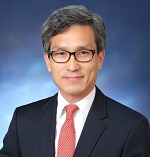 Prof. Chungsik Yoo
Prof. Chungsik YooSungkyunkwan University, Korea
Professor Chungsik Yoo is currently Professor of Civil, Architectural Engineering and Landscape Architecture at Sungkyunkwan University (SKKU) in Korea. He is the President of International Geosynthetics Society (IGS). Professor Yoo is active in international tunneling community and has served as an Executive Council member and Animateur of Working Group 2 of ITA. Professor Yoo obtained his MSc and Ph.D. degrees in Civil Engineering from the Pennsylvania State University in 1989 and 1993, respectively. After briefly working at Mueser Rutledge Consulting Engineers in USA as a Geotechnical Engineer, he returned to Korea and joined SKKU as Assistant Professor in 1994. Since then, Professor Yoo is continuing to serve as a professor at SKKU and has served as Chair Professor of School of Civil and Architectural Engineering from 2014 to 2016 and as Vice Dean of College of Engineering from 2017 to 2018. Professor Yoo has co-authored over 400 technical papers, including SCI journal papers and conference papers, in geotechnical engineering and tunneling based on laboratory testing, numerical modeling, and field testing. He was a recipient of 2010 IGS Award from the International Geosynthetic Society (IGS). Professor Yoo also received many awards from the Korean Civil Engineering Society, Korean Geotechnical Society, Korean Tunnelling and Underground Space Association, and Korean Geosynthetics Society including the Best Scientific and Engineering Paper Award from the Korean Federation of Science and Technology Societies in 2014. Currently, he is a Co-Editor in Chief of Geotextiles and Geomembranes and an Associate Editor of Tunnelling and Underground Space Technology, Soils and Foundations. He is also an Editorial Board Member of Geosynthetics International and Computers and Geotechnics.
Special Keynote Lecture
Geodynamics of Ballastless High-speed Railway
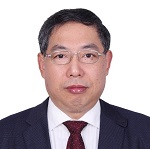 Prof. Yunmin Chen
Prof. Yunmin ChenChair Professor of Civil Engineering Zhejiang University, China
Dr. Yunmin Chen, born in 1962, is a Chair Professor of Civil Engineering at Zhejiang University. He was educated at Zhejiang University (1979-1989) with a BSc (Building Structural Engineering, 1983), MSc (Structural Engineering, 1986) and PhD (Geotechnical Engineering, 1989). From 1993-1995, he was a visiting scholar at IFCO Foundation Expertise in Netherlands. In 2015, he was elected as the Academician of the Chinese Academy of Sciences in recognition of his contribution in the field of geotechnical engineering. Currently, he serves as the Chief Scientist of a National Large Research Infrastructure project—Centrifugal Hypergravity and Interdisciplinary Experiment Facility (CHIEF), and the principal investigator of a Basic Science Center Program—Multiphase Evolution in Hypergravity—supported by the National Natural Science Foundation of China. He is Co-Editor-in-Chief of the highly regarded International Journal Transportation GEOTECHNICS, and presently serves on the Editorial Board of 6 other international esteemed journals. He was the founder of the conference series on Environmental Vibration and Transportation Geodynamics. He has published more than 300 refereed journal papers and been recognized by many awards, including three Second Prizes of The State Scientific and Technological Progress Award, the Outstanding Journal Paper Award by ASCE in 2015, and the Mao Yisheng Science and Technology Award in 2017. One of his experimental facilities named Innovative High-Speed Rail Tester (ZJU-iHSRT) was awarded as one of Top Ten Scientific and Technological Progress of Chinese Universities in 2017.
Special Keynote Lecture
Characterization of Geo-Materials for Airport Pavements – Current State of the Art & Future Outlook
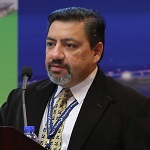 Dr. Navneet Garg
Dr. Navneet GargProgram Manager
National Airport Pavement & Materials Research Center (NAPMRC)
FAA William J. Hughes Technical Center
Dr. Navneet Garg is a Program Manager in Airport Technology R&D Branch at the FAA’s William J. Hughes Technical Center in Atlantic City, New Jersey, and manages projects on Full-Scale Accelerated Pavement Testing, Field Instrumentation and Testing, and Pavement Materials. He earned his Ph.D. from the University of Illinois at Urbana-Champaign in 1997 and his M.S. from the Illinois Institute of Technology, Chicago, in 1993, both in civil engineering. He has been actively involved in airport pavement research at the FAA’s National Airport Pavement Test Facility since 1998, and has authored several FAA technical reports, and research papers for various journals and conference proceedings. He has taught in airport pavement design and evaluation workshops for ICAO, Asphalt Institute, Airport Consultants Council, and has been a member of several master’s and doctoral degree students thesis committees. He is the winner of “2018 T&DI Airfield Pavements Practitioner of the Year” award given by American Society of Civil Engineers (ASCE), and “2004 Engineer of the Year” award given by the Southern New Jersey Professional Societies (American Institute of Aeronautics & Astronautics AIAA, Institute of Electrical & Electronics Engineers IEEE, and IEEE Computer Society). He is the current Vice-Chair of ASCE Airfield Pavement Committee, past Chairman of Heavy Vehicle Simulator International Alliance, and the Associate Editor of International Journal of Pavement Engineering (IJPE). He is a member of TRB Committees on General and Emerging Pavement Design (AFD30), Geotechnical Instrumentation & Modelling (AFS20), Aggregates (AFP70).
Special Keynote Lecture
Track Geomechanics for Future Railways: Use of Artificial Inclusions
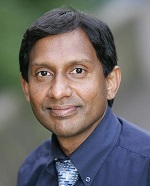 Prof. Buddhima Indraratna
Prof. Buddhima IndraratnaDistinguished Professor of Civil Engineering and Director of Transport Research Centre, University of Technology (UTS), Sydney (from August 2020)
Distinguished Professor of Civil Engineering, and Research Director, Centre for Geomechanics & Railway Engineering
University of Wollongong, NSW, Australia; Executive Director, Australian Government’s National Training Centre for Advanced Technologies in Rail Infrastructure (ITTC-Rail)
Prof Buddhima Indraratna is a Civil Engineering graduate from Imperial College, London. Since his PhD from the University of Alberta in 1987, his significant contributions to geotechnical and railway engineering have been acknowledged through numerous national and international awards, including the 1st Ralph Proctor Lecture and 4th Louis Menard Lecture of the International Society of Soil Mechanics and Geotechnical Engineering. In 2009, he delivered the prestigious E.H. Davis Memorial Lecture of the Australian Geomechanics Society for his contributions to theory and practice of geotechnical engineering.
For his pioneering contributions to ground improvement and transport infrastructure, he was honoured with the Business and Higher Education award by the Australian Government in 2009, Engineers Australia Transport Medal in 2011, and the combined Engineers Australia-New Zealand Railway Society’s Outstanding Individual Award in 2015. Over the past 2 decades, he has also received prestigious international awards, including Thomas Telford Award by the Institution of Civil Engineers UK, Robert Quigley Award by the Canadian Geotechnical Society, and the 2017 Medal of Excellence for life-time contributions, the highest accolade by the International Association of Computer Methods and Advances in Geomechanics.
Prof Indraratna currently leads numerous projects funded by the Australian Research Council at an annual research income of $2 million/year, and he has been a consultant to various geotechnical and rail organisations worldwide. He has more than 800 publications, over 350 Journal articles, 11 books and over 60 invited Keynote papers, and has successfully supervised over 60 PhD graduates and 30 Postdoctoral Fellows. He has been a national and international consultant in numerous major projects worldwide, and to name a few, ground improvement at 2nd Bangkok International Airport, Port of Brisbane and Wollongong harbour reclamations work, Pacific Highway north of Sydney, Melbourne to Brisbane Railway, and post-tsunami reconstruction in Sri Lanka.
Professor Indraratna is a Fellow of several professional bodies including the most prestigious Australian Academy of Technology and Engineering, as well as being a Fellow of the Institution of Engineers, Australia, Fellow of American Society of Civil Engineers (FASCE), and a Fellow of the Geological Society of UK.
Special Keynote Lecture
An Overview of Ground Improvement Studies to Better the Performance of Transportation Infrastructure
 Prof. Anand J. Puppala, Ph.D., P.E., D.GE, F. ASCE
Prof. Anand J. Puppala, Ph.D., P.E., D.GE, F. ASCEA.P. Wiley and Florence Chair of Zachry Civil and Environmental Engineering
Associate Director of Center for Infrastructure Renewal (CIR)
Texas A&M University College Station, Texas
Dr. Anand Puppala currently serves as A. P. Wiley and Florence Chair of Zachry Civil and Environmental Engineering at Texas A&M University and is also an Associate Director of Center for Infrastructure Renewal (CIR). He served as a Distinguished Scholar Professor in the Civil Engineering department and served as Associate Dean – Research in College of Engineering at the University of Texas at Arlington (UTA) in Texas, USA. He has over 25 years of experience in teaching, research, continuing education and administration in public Universities in Texas. Dr Puppala has been conducting research on stabilization of expansive soils, sustainable utilization and stabilization of recycled materials for low to high volume roads, in situ intrusive methods for site characterization, infrastructure resilience and pavement material characterization studies. Dr. Puppala has been a recipient of several major research grants from federal, state and local government agencies. Dr. Puppala is the director of NSF’s Industry University Co-operative Research Center (IUCRC) on Composites in Civil Infrastructure (CICI) at UTA.
Dr. Puppala is the current Chair of Soil Mechanics section (AFS00) of the Transportation Research Board (TRB) and is a member of Design and Construction group of TRB. He chaired American Society of Civil Engineers (ASCE)’s Geotechnical Institute’s (GI) “Engineering Geology and Site Characterization” committee and TRB committee on ‘Soil and Rock Instrumentation’. He has extensively published with well over 400 publications and participates with many esteemed organizations including TRB to develop and deliver workshops, conference sessions, webinars and technical programs to local, state and industry as well as academic personnel. He received many awards and distinctions including recent 2020 Ralph Peck Award from ASCE-GI.
Special Keynote Lecture
Mechanistic-Empirical Pavement Design Considerations of Swelling/Shrinkage of Expansive Soils
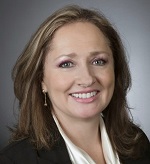 Prof. Claudia E. Zapata
Prof. Claudia E. ZapataAssociate Professor
School of Sustainable Engineering and the Built Environment
Deputy Director, NSF Engineering Research Center for Bio-mediated and Bio-inspired Geotechnics
Arizona State University
Claudia Zapata is an Associate Professor in the School of Sustainable Engineering and Built Environment and the Deputy Director for the NSF Center for Bio-mediated and Bio-inspired Geotechnics. She has authored more than 70 technical publications on research related to unsaturated soil behavior, characterization of problematic soil properties, thermo-hydro-mechanical behavior of soils due to static and repeated loading, empirical modeling of fluid flow and volume change of soils applied to pavement structures and residential foundation systems, and environmental effects on soil behavior. She is the past Chair of the Transportation Research Board committee on the Behavior of Unsaturated Geomaterials and active member of several TRB and ASCE committees, including TRB Committee on Seasonal Climatic Effects on Transportation Infrastructure (AFP50) since 2010; ASCE Geo-Institute Unsaturated Soils Committee since 2008; TRB Engineering Behavior of Unsaturated Soils Committee (AFP60) since 2007; TRB Latin-American Transportation Research and Practice Subcommittee (2006-2010); and the ASCE Arizona Geotechnical Division subcommittee since 2006. Dr. Zapata’s career highlights include her active participation in the development of the newest Mechanistic-Empirical Pavement Design Guide; the development of models to incorporate environmental effects and problematic soils behavior into current pavement design practice; and the development of a database of soil properties for more than 35000 unsaturated soils for the continental United States, Hawaii and Puerto Rico.
Dr. Zapata’s career highlights include her active participation in the development of the newest Mechanistic-Empirical Pavement Design Guide; the development of models to incorporate environmental effects and problematic soils behavior into current pavement design practice; and the development of a database of soil properties for more than 35000 unsaturated soils for the continental United States, Hawaii and Puerto Rico. In 2019 she was selected to receive the Ira Fulton School of Engineering Top 5% Teaching Award for her “outstanding contributions to the education of our students”. As Deputy Director of CBBG, she has made important contributions to broadening the participation of k-12 and under-represented populations in the field, and has overviewed more than 30 public events and three summer programs in the past year. On this role, she has striven to broadening the participation of k-12 and under-represented populations in the field, effort that awarded her the nominations to the Faculty Women Association (FWA) 2019 Outstanding Faculty Mentor Award and to the ASU Excellence in Diversity and Inclusion Award in 2015.
Special Keynote Lecture
Properties Governing the Design of Geosynthetic-stabilized Roadway Bases
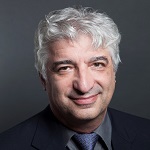 Prof. Jorge G. Zornberg, Ph.D., P.E., F.ASCE
Prof. Jorge G. Zornberg, Ph.D., P.E., F.ASCEPriddy Centennial Professor in Engineering
The University of Texas at Austin
Prof. Zornberg has over 30 years’ experience in practice and research in geotechnical and geosynthetics engineering. As an engineering consultant, he has been involved in the design of civil, transportation, mining and waste containment infrastructure. He has served as expert witness in numerous litigation and forensic cases. As a researcher, he focuses on transportation geotechnics, geosynthetics, unsaturated soils, expansive clays and environmental geotechnics. From 2010 to 2014, Prof. Zornberg served as president of the International Geosynthetics Society (IGS). He currently chairs the Geosynthetics Technical Committee of the Geo-Institute of ASCE. He has authored over 450 technical publications, edited a number of proceedings and book chapters, and been awarded three patents. Prof. Zornberg has been invited to deliver keynote lectures in numerous events around the world. He has also received many prestigious awards, including the Mercer Lecture, ASCE’s Croes Medal, IGS’ Award, ASCE’s Collingwood Prize, and IGS’ Young Member Award, as well as the Presidential Early Career Award for Scientists and Engineers (PECASE) awarded by the President of the United States.
